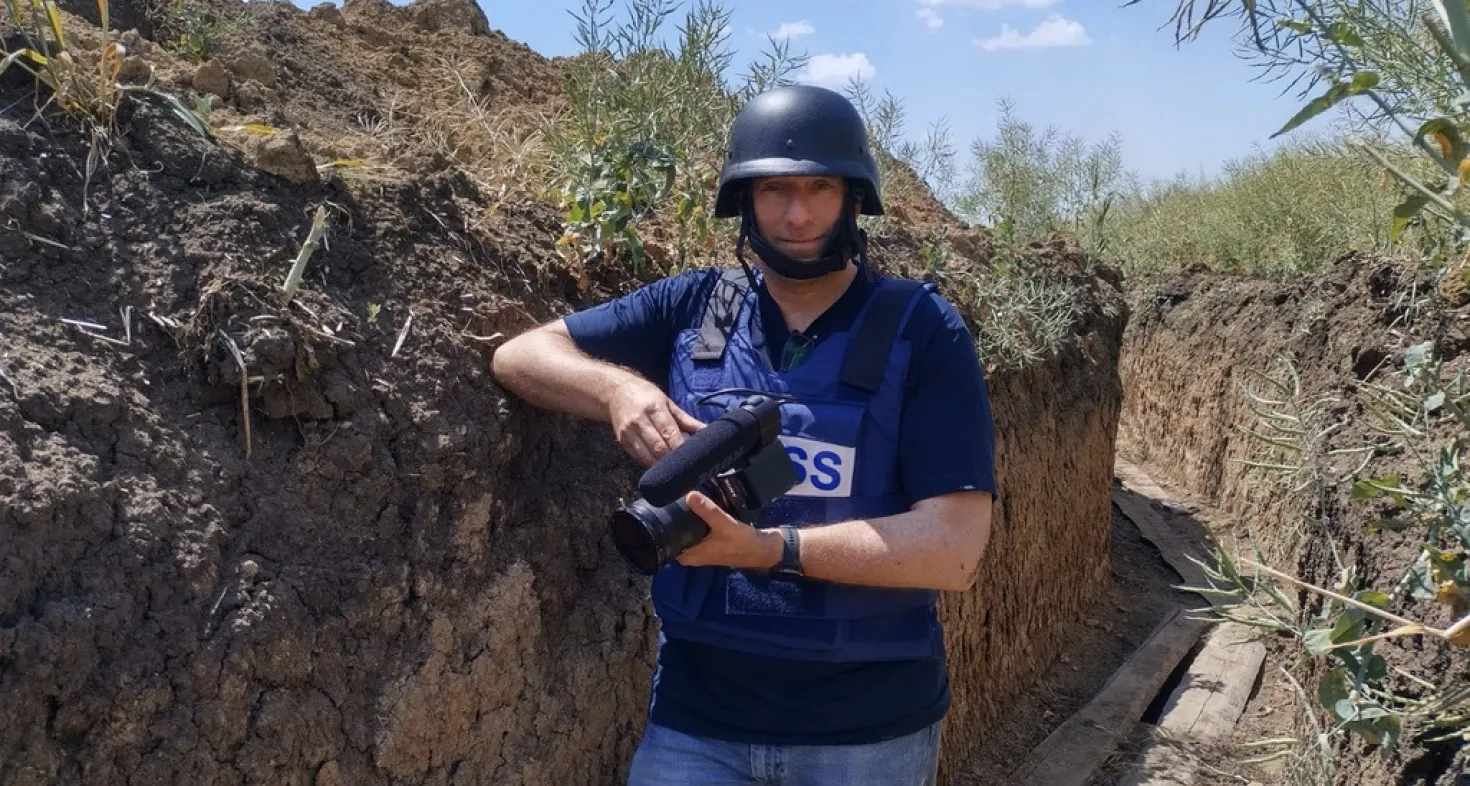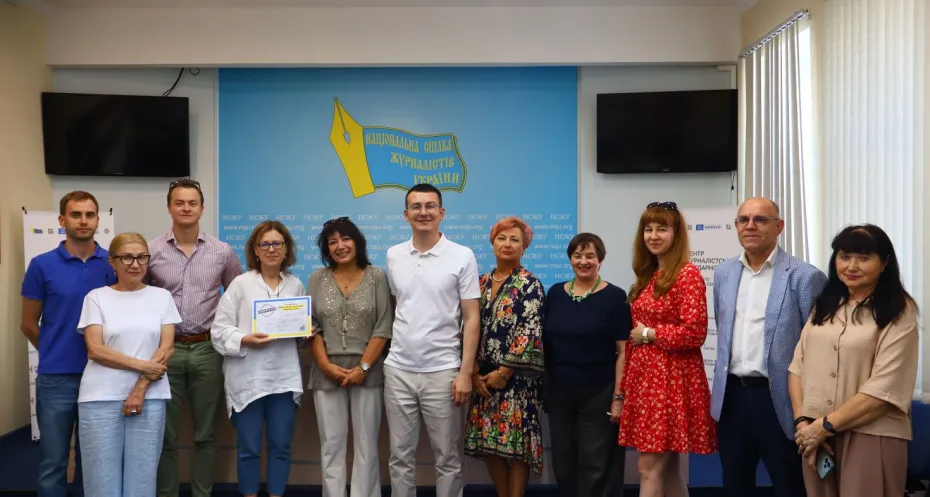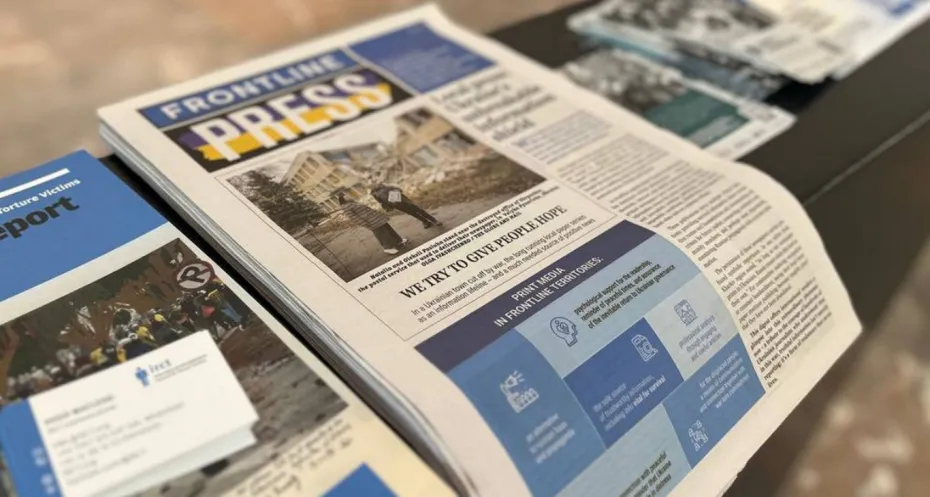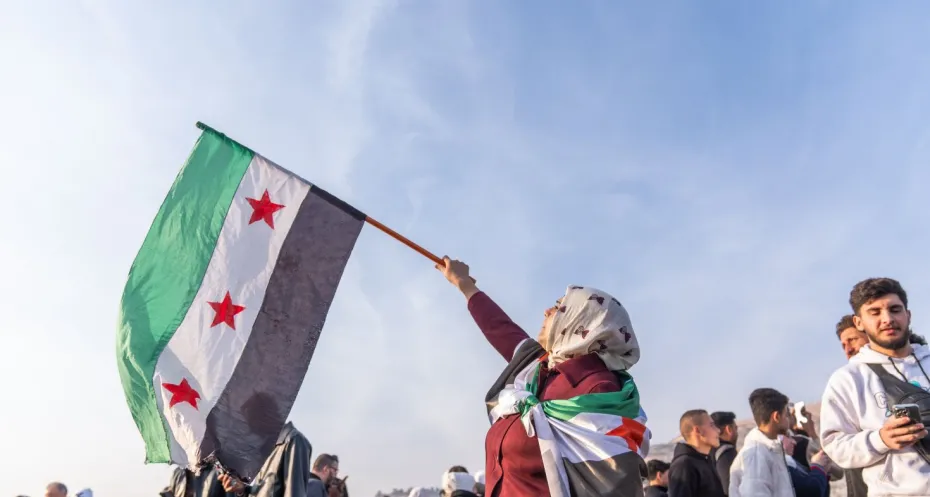
Safety for journalists in Ukraine and why "it’s important to keep telling the story"
Dutch freelance war reporter Marcel van der Steen has already worked in many places, including Syria and Iraq, to visualize the impact of war. In March 2022, he went to Ukraine to report for the first time after which he returned to the Netherlands. Now a month and a half later, he decided to go back to Odessa, but before leaving, he stopped by Free Press Unlimited to pick up two ballistic vests and a helmet.
Carrying this heavy protective gear for himself and his fixer (local contact who helps with on-the ground arrangements), Marcel van der Steen left for Odessa, Ukraine. Free Press Unlimited spoke to him two days after his arrival via Zoom. “You notice less of the impact of war here. The atmosphere in Odessa is lively, even though there are of course no tourists, only journalists and aid workers. There are many people on the streets, and everywhere the blue and yellow flag hangs in the streets. People carefully take a seat on a terrace, and the curfew has been moved from 9 to 11 p.m. It is quite relaxed in this city, but at the same time the war is still very close and the threat remains.”
The quietness in the city turns out to be misleading indeed. Two days later, van der Steen tells us that around 11 Russian missile attacks took place in the outskirts of Odessa. What the goal was is not yet clear, but that the war is never really far away, definitely is.
Keep telling stories
Van der Steen has already spoken with his fixer about the possibility of accompanying the Ukrainian army or volunteers, to make a story for a Dutch news medium. He wants to go back to the ever-shifting front line towards Southern Ukraine in the cities of Mykolayiv and hopefully towards Kherson to see how things are going there. A risky mission.
When asked why he thinks it is important to do this work, he replies: "It is important to continue to tell the story of Ukraine, because now that we are three months into the war, you see that attention is fading. That's why I think it's important to be here again. I like to tell the story, in this case of Ukraine, but also in the Middle East before, by zooming in on the personal stories. How does it affect people here that there is a war going on, or that they are being driven from their home?”
Telling the story in this way is an important motivation for him because he notices that it keeps people more involved. “Just stating the facts isn't enough to keep people hooked. You have to get it across by telling a story that makes someone feel like: That could be me. I could be in that situation.”
Crucial role of fixers, drivers and translators
There goes a lot of work into preparing and making a story in a war zone. Fixers, drivers and translators play an indispensable role in this. Yet their role is often underexposed. This was also under discussion when the crisis in Afghanistan broke out and Free Press Unlimited lobbied to get fixers on the evacuation list as well.
Van der Steen says: “Fixers, drivers and translators are really vital for journalists in areas like here in Ukraine, in so many ways. I can't work here without them; I don't speak the language and I don't know the area well enough. A fixer is necessary for your local contacts, but also, for example, to determine which story is important to tell at that moment. I also discussed this with my fixer last night: What is going on right now? What is important? What story are we going to tell here in Odessa, or Mykolaiv or Kherson or perhaps further east? And what is possible then? What about safety?”
Safety is priority
Safety is a priority when preparing and making stories. “I also discuss this with my fixer. For example, is it a wise idea to spend the night in Mykolaiv, about an hour and a half from here? On the one hand you may want this because it adds something to your story to experience the night there, on the other hand it carries a lot more risk because missiles regularly fall on that city. This consideration, that's what a fixer is for. So a fixer is vital, and also gets too little credit for his or her work.”
Journalists often build a relationship of trust with fixers, drivers and translators. In the case of a driver, for example, you sometimes literally put your life in their hands when they guide you through a war zone. “And I also feel responsible for the people I work with. That is why it is extra nice that thanks to the help of Free Press Unlimited I can also provide them with protective material such as a bulletproof vest and helmet. Especially as a freelancer it is extra nice to receive this support. I also worked for the NOS (Dutch public broadcaster red.) before and then you always receive two sets, one for you and one for your fixer. As a freelancer, that is not self-evident.”

Support for media workers in Ukraine
Unfortunately, it is not yet possible for every journalist in Ukraine to protect themselves with a ballistic vest and helmet. As part of Media Lifeline Ukraine, Free Press Unlimited is working hard to improve this.
Van der Steen: “Especially the fixers and drivers often do not yet have any protective material. Or they walk around with a green vest or in camouflage colors, which you can better not do as a journalist and as a fixer, because it makes you even more of a target. At the same time, it is also possible that you are a target with PRESS stated on your chest. That shouldn't be the case, but that can be the case in practice, we have also seen that happening here. But in principle you should not walk around in camouflage or green clothing as a journalist or fixer. We have blue vests, and a black or blue helmet. It is very important to bring that here for fixers and drivers as well.”
He continues: “It is vital, especially in a war, to have people who show what is happening. Who tell the story as it is to keep people in the rest of the world involved in what is going on in Ukraine. And the local journalists can't do that without the support of the rest of the world, in this case with vests and helmets for their own protection. Journalism now is crucial in Ukraine, so incredibly important. So supporting that is also very important.”




